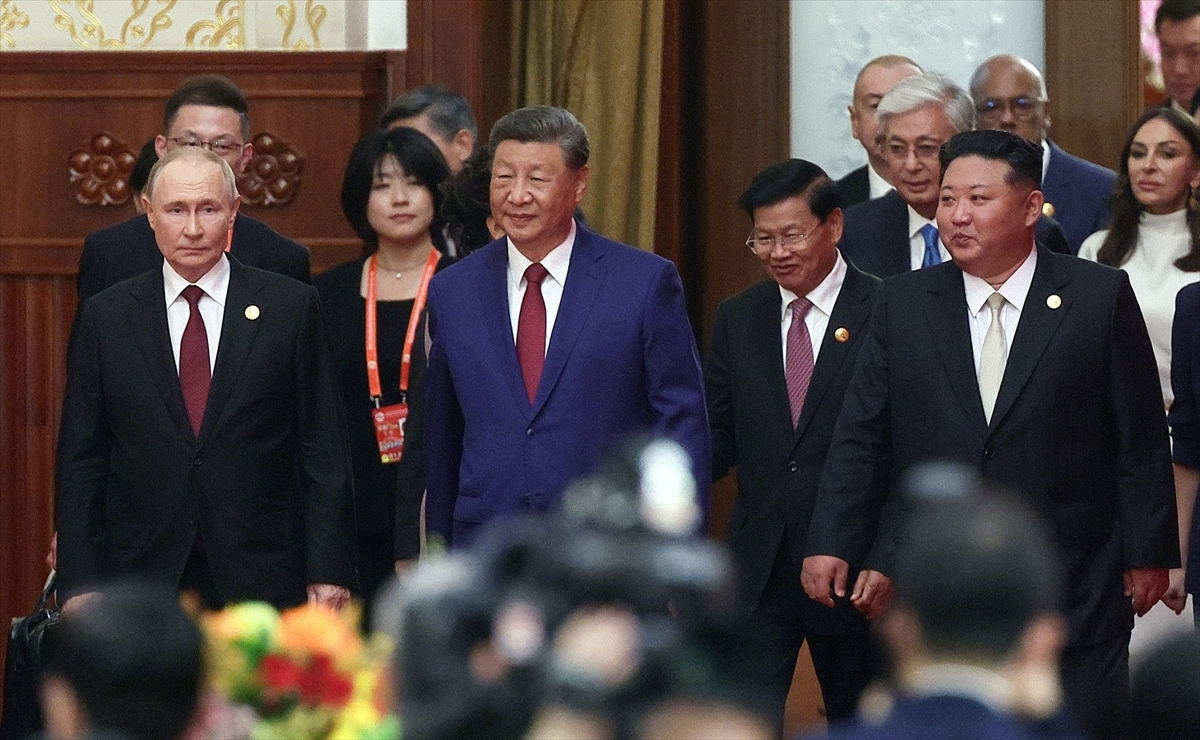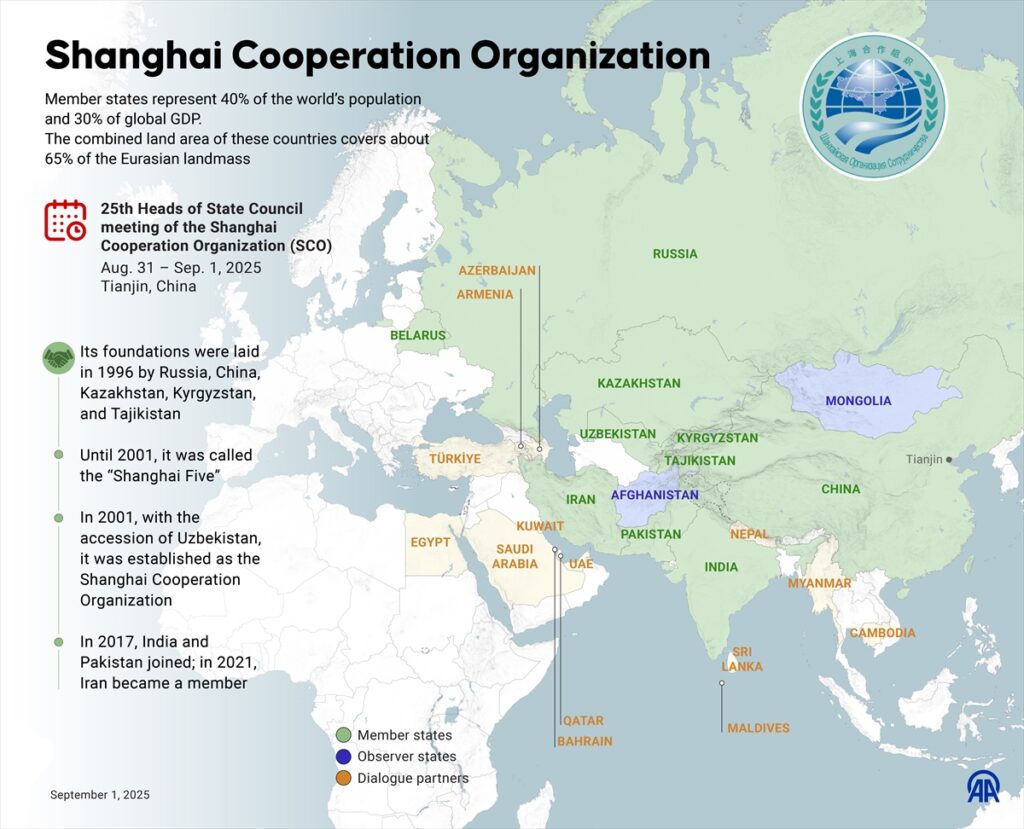
By Iqbaal Abdi
Donald Trump reignited tensions with Beijing when he posted a photo of Xi Jinping, Vladimir Putin and Narendra Modi on Truth Social. The caption read: “Looks like we’ve lost India and Russia to deepest, darkest China. May they have a long and prosperous future together.” Later that evening, Trump sought to soften the blow, insisting that the U.S. still considered Modi a friend. Modi echoed the sentiment on X, but the episode underscored growing unease in Washington over China’s global manoeuvres.
China hosted two major events cryptically with a message for Western observers. On Monday, September 1, China held the Shanghai Cooperation Organisation (SCO) summit in Tianjin, north-eastern China. With more than 20 heads of state across three continents in attendance, it showcased China’s diplomatic prowess on the global stage.
The SCO evolved from the Shanghai Five, established in 1996 to address border disputes following the collapse of the Soviet Union. Its founding members were China, Russia, and several post-Soviet Central Asian states. In 2001, the Shanghai Five formally transitioned into the SCO, adopting broader goals that encompassed not only security but also economic cooperation. Over the past quarter century, the organisation has expanded to 10 full members, including Pakistan, India, and Iran, and now engages a further 16 countries as observers and dialogue partners.
This year’s summit had significant implications. It displayed the strongest U.S. rivalries and competitors embracing each other throughout the two-day summit. Xi, Putin and Modi were often captured together — images thatpiqued the attention of Western policymakers. Modi’s presence was particularly striking. It came in direct response to the U.S. tariffs imposed on India for continuing to buy Russian oil after sanctions were imposed , sending a clear message to Trump that India has alternatives in its choice of allies.
However, India’s manoeuvre around the global arena was not the loudest message heard. Xi’s speech during the summit openly challenged the current US-led international order.
“We should practice multilateralism. We should uphold the vision of global governance featuring extensive consultation and joint contribution for shared benefit, strengthen solidarity and coordination, and oppose unilateralism,” said Xi.
In addition to condemning power politics and hegemony, Xi repeatedly placed China as a voice for the global south, stating that “international law and rules should be applied equally and uniformly. There should be no double standard.”
When describing the current global order through a western lens, it may be called a rules-based order. However, repeated criticisms from the global south are that there is a double standard in the way international law is applied.

The most recent example of western hypocrisy is the genocide in Gaza, which in itself has cemented criticism of western exceptionalism. Despite war crimes against the Gazan population perpetrated by Israel, Western governments, especially the U.S., have remained inactive.
In contrast, Ukraine has received over Є35.1 billion from Europe in military aid alone, according to the Kiel Institute. With US sanctions on Russian oil and the freezing of Russian Central Bank assets from the EU, isolating Russia from the global financial system has formed a piece of the pie in the policies of punishment against Russian aggression. Ukraine’s unprecedented support only makes the silence of the West on Gaza more deafening.
If Xi’s intention for the SCO summit was to propose an alternative global order to counter U.S. hegemony by illustrating ties to other powerful nations and leveraging the global south’s grievances against the US-led order, Xi was undoubtedly successful.
It is, however, important to raise questions on whether China and the U.S. are two sides of the same coin. China’s record of upholding human rights, with the oppression of the Uyghur population in Xinjiang, births scepticism on Xi’s version of a just global order.
In the same week, China hosted world leaders in Beijing, including Kim Jung Un for the 80th anniversary of defeating Japan and winning the Anti-Fascist War. The military parade showcased the People’s Liberation Army’s might. New missiles and drones with cutting-edge technology were unveiled, underlining China’s growing ability to challenge U.S. military superiority.
Trump responded by posting ‘Please give my warmest regards to Vladimir Putin and Kim Jong Un as you conspire against the United States of America’.
Tensions between China and the U.S. are ever-growing. China has begun forming its bloc in synchrony with Trump’s policies of isolation and protectionism. How Trump will contest America’s unipolar leadership of the international order remains unanswered. Whether he will reverse tariffs and re-establish funding for international institutions, refilling the global vacuum left by his policies — or instead gearing towards confrontation with China — remains open to question.
What is known is that Trump will have to rethink U.S. relations with Asian states. Trump’s stance on Pakistan is evolving with the growing rift with Modi. Likewise, traditional allies in Asia, such as Japan and South Korea, are becoming increasingly sceptical of their dependency on Washington.
The Asia-Pacific Economic Cooperation meeting in October 2025 which Xi and Trump are expected to attend, will be significant in establishing foe from ally, (re)setting the temperature of US-China rivalry and painting the geopolitical landscape.
Iqbal Abdi, Graduate, Politics & International Relations
[Photo: Chinese President Xi Jinping (C), Russian President Vladimir Putin (L) and North Korean Leader Kim Jong Un (R) arrive for the formal reception in the Great Hall of the People, following a military parade marking the 80th anniversary of the end of World War II, in Beijing on September 3, 2025. Photojournalist: Vladimir Smirnov / Tass/Handout/AA]